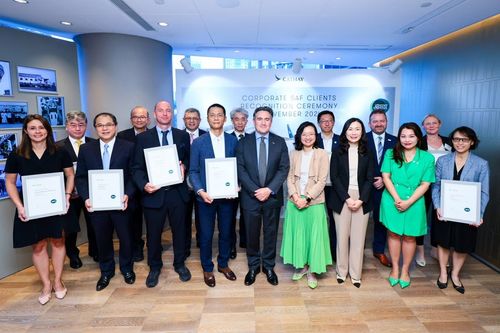Cathay celebrates record growth in its corporate program to advance SAF use

SOURCE: Cathay
November 7, 2024
BY Cathay
Cathay continues to make significant progress in its sustainability journey, reaching new milestones since the launch of its Corporate Sustainable Aviation Fuel (SAF) Programme in 2022. This year, the program has achieved substantial growth and is becoming one of the biggest initiatives of its kind globally, marked by new global partnerships and a record commitment to SAF usage.
Building on the momentum of the past two years, the Corporate SAF Programme has introduced a tiered structure, allowing customers to participate based on their SAF demand and business needs. Cathay is excited to welcome DB Schenker, the biggest contributor to the program to date, and Kuehne+Nagel as Diamond partners, EQT as a Gold partner, and Julius Baer and Lenton Group as Silver partners, bringing the total to 15 partners this year. Notably, this year has seen multi-year commitments from partners as they view SAF as a long-term solution to their decarbonization journey, reinforcing Cathay’s 2030 SAF target.
Cathay also recognizes the continued commitment of some of its longstanding partners, including Airport Authority Hong Kong, AIA, Dimerco Express Group, Kintetsu World Express, Standard Chartered Bank, Swire Pacific, Yusen Logistics, and the Business Environment Council. This diverse partnership base reflects a strong commitment to reducing the climate impact from both business travel and airfreight services, and across different sectors in our community.
Advertisement
Advertisement
The program partners together in 2024 have committed to using 2,650 metric tons of SAF (equal to 906,000 US gallons), equivalent to a reduction of approximately 8,060 metric tons of carbon emissions, three times the reduction achieved last year.
Cathay Group CEO Ronald Lam said, “Our Corporate SAF Programme has now entered into its third year and keeps expanding. The program is a key pillar in Cathay’s overall approach to leading the aviation industry’s decarbonization. With growing support from our corporate travel and cargo customers, Cathay continues to increase SAF usage across our network worldwide. In doing so, our customers are able to help reduce emissions from their air travel and airfreight.”
Advertisement
Advertisement
SAF remains the most crucial lever for decarbonizing airline operations before alternatively powered aircraft can be widely deployed in commercial operations. Compared to conventional jet fuel, SAF can reduce over 80% of carbon emissions on a lifecycle basis, depending on the SAF technology and feedstock used.
Cathay Pacific was among the first airlines in the world to announce a target of 10% SAF for its total fuel use by 2030. Since then, the airline has successfully conducted SAF uplifts at both Hong Kong International Airport and other airports overseas.
In addition to scaling up SAF adoption, Cathay also relies on fleet modernization, operational efficiency improvements, leveraging on emerging technology breakthroughs to decarbonize aviation, and high-quality carbon offsets and removals to achieve the long-term net-zero carbon emissions goal by 2050. Additional information about Cathay’s Corporate SAF Programme can be found here.
Related Stories
The USDA’s Risk Management Agency is implementing multiple changes to the Camelina pilot insurance program for the 2026 and succeeding crop years. The changes will expand coverage options and provide greater flexibility for producers.
EcoCeres Inc. has signed a multi-year agreement to supply British Airways with sustainable aviation fuel (SAF). The fuel will be produced from 100% waste-based biomass feedstock, such as used cooking oil (UCO).
President Trump on July 4 signed the “One Big Beautiful Bill Act.” The legislation extends and updates the 45Z credit and revives a tax credit benefiting small biodiesel producers but repeals several other bioenergy-related tax incentives.
SAF Magazine and the Commercial Aviation Alternative Fuels Initiative announced the preliminary agenda for the North American SAF Conference and Expo, being held Sept. 22-24 at the Minneapolis Convention Center in Minneapolis, Minnesota.
Saipem has been awarded an EPC contract by Enilive for the expansion of the company’s biorefinery in Porto Marghera, near Venice. The project will boost total nameplate capacity and enable the production of SAF.
Upcoming Events










